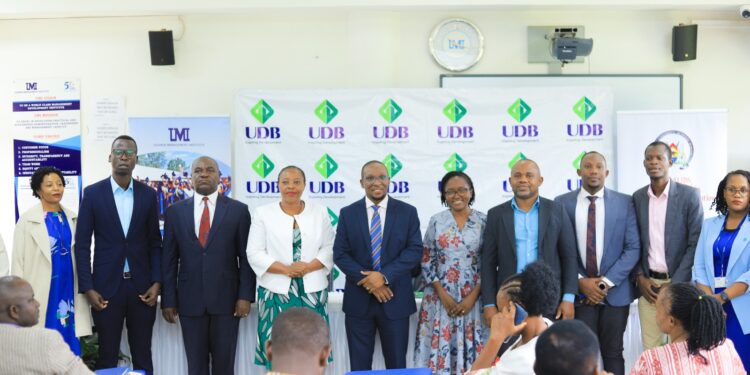Uganda Development Bank (UDB), the country’s National Development Finance Institution, on Tuesday launched the Incubator Program under Enterprise Development Product (EDP). The program is designed to prepare enterprises to become investor ready, according to organizers.
The launch was announced during a press briefing held at Uganda Management Institute (UMI). UDB officials say; the program will train an inaugural cohort of 291 enterprises across the country on management best practices, debt management, good governance, record keeping, and financial management among others.
UDB states in a statement, that this training is based on the Bank’s wider knowledge of the business, the operating environment, and experience gained from funding, implementing, and monitoring such projects.
“The program shall be implemented alongside the Bank’s partners; including Uganda Registration Services Bureau (URSB), Uganda National Bureau of Standards (UNBS), Uganda Revenue Authority (URA), Uganda Investments Authority (UIA), National Social Security Fund (NSSF) and Uganda Women Entrepreneurs’ Association Limited (UWEAL)”, reads the UDB statement in part.
Speaking at the launch, The Managing Director of Uganda Development Bank Ms. Patricia Ojangole, represented by Mr. Mwesiga Joshua – Director Strategy and Corporate Affairs, said:
“Together with our partners, we have unveiled the Incubation Program, an initiative that will provide capacity-building training and offer technical support to develop and implement the required processes in the businesses. The objective is to have professionally run businesses that survive the test of time, and that are investor ready.”
Ms. Ojangole added: “SMEs constitute 90 percent of the private sector and contribute 80 percent of all manufacturing output, providing 2.5 million jobs. However, only 30 percent of them survive beyond their third year of operations. Business sustainability is a major problem among Ugandan SMEs, and as a bank, we recognize these issues and are making deliberate efforts to intervene and build sustainable businesses. This is in line with our mandate of improving the quality of lives of Ugandans.”
During the media briefing, Babara Kasekende, Head of Business Advisory at the bank, highlighted how this program is the heartbeat of the bank. She explained that the EDP was created to bridge the gaps between SMEs and access to finance.
“This program is aimed at increasing our footprint and impact on Ugandan businesses across the country through Business development services. Handholding entrepreneurs develops the knowledge and skills necessary to grow and sustain their businesses,” she noted.
She added that; the incubator program will have a hybrid approach that will be implemented by UDB and Makerere Business School Entrepreneurship Innovation and Incubation Center (MUBS EIIC) for a period of three to nine months.
“The program will offer training with a customized curriculum designed for Ugandan businesses. The curriculum was created based on the feedback and findings from the first cohort and has been improved to cater to the specific needs of the enterprises and the environment in which they operate”, she added.
Ms. Ojangole lauded URSB, UNBS, URA, UIA, NSSF and UWEAL for their critical role in the socio-economic transformation of Uganda and pledged the Bank’s continued commitment towards this agenda.
“UDB is committed to collaborating with its partners to innovate pragmatic solutions to promote socio-economic development. The Bank’s aspiration is to continue serving as a trusted partner to our customers by responsibly providing financial and non-financial services that enable socio- economic progress. Our core activities are hinged on extending relevant solutions that ensure the sustainability of these businesses,” She concluded.
Uganda Development Bank Limited (UDB) is the country’s national Development Finance Institution (DFI) with a mandate to accelerate socio-economic development in Uganda through sustainable financial interventions. Consistent with this mandate, the Bank supports projects within the private sector that demonstrate the potential to deliver high socio-economic value, in terms of job creation, improved production output, tax contribution, and foreign exchange generation, among other outcomes.
These projects fall within the key priority sectors of our economy and in line with Uganda’s development priorities. The Bank’s financing interventions are mainly in Primary Agriculture, Agro-processing, and manufacturing which account for about 80 percent of its investment portfolio. The Bank however undertakes specific interventions in other sectors including Tourism, Human Capital.
Under the program, the Bank supports enterprises that have the potential for financing from financial institutions but still do not meet the requirements for credit financing. The bank supports enterprises through the following; Regional training and capacity-building programs, Regional Business Incubation programs, Master class programs, Structured Short Courses and Resource and data centre among others.
Do you have a story in your community or an opinion to share with us: Email us at editorial@watchdoguganda.com













